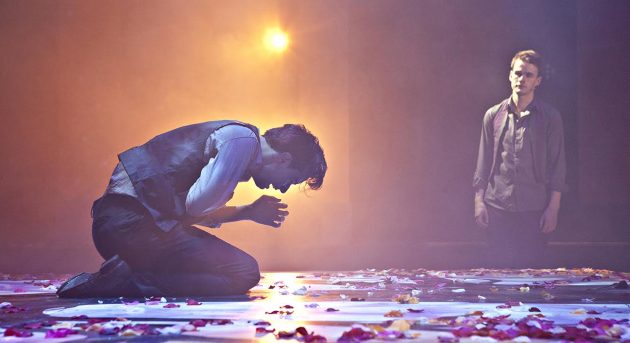Brent Trotter talks Spring Awakening and mental health in the arts
Spring Awakening is one of a rare few musicals that transcends time periods and generational gaps, advocating for a society where young people are allowed the knowledge and support to make decisions about their lives and bodies. Full of sadness and beauty, the themes of mental health, abuse and repression of sexuality in Spring Awakening are just as current now as they were when Frank Wedekind’s play (the musical’s source material) was written in the 1890s. We spoke to Brent Trotter, currently playing Moritz Stiefel in StageArt’s production of the show, asking him to talk us through some of the themes within the musical and how they intertwine with the lives of modern day theatre artists and audiences.
Spring Awakening is considered a “sister show” of RENT, Next to Normal and Bare: A Pop Opera, all of which are concerned with themes of mental illness and repressive societies. Why do you think these musicals have become such popular cult shows within the theatre community, particularly amongst teenagers?

When I first began in theatre, social media didn’t exist, and the most exciting thing you could do socially was to have a three-way conversation on one of the new phones. Much like Moritz I learned most of what I knew from my peers and as a kid my parents had a lot more control over what I was exposed to. The difference with today’s teens is that they live in a world where entire parts of human history are at their fingertips, where websites like Google and YouTube control how much they know. They have a thirst for knowledge, and just like adults want theatre that is relatable. I also feel that surrounded by social media teens are developing insecurities at a much younger age and relate a lot more to problems that only adults could years ago. These problems are now labeled and kids aren’t just seen as being “weird” or “hyperactive”… You only need to look at the popularity of Dear Evan Hansen, to prove my point.
Do you believe there is a way to distance yourself as an actor from the character you are playing, particularly if their negative mental health is a big part of the show?
As the old saying goes, “ignorance is bliss”. It is definitely possible for a person to distance themselves from such heavily emotional material, but as an actor, if I want to perform an honest portrayal of a character’s journey, I don’t believe I can allow myself that luxury. Don’t get me wrong, I don’t believe that I “become” the character in every way but I am most certainly aware of them and their world… The hardest part for me personally when dealing with this is that as soon as I step foot on the stage, there’s inevitability in my character’s fate. Moritz has no idea where these feelings he’s having will lead him, but it’s in the script. I know he has to get to a point where there is only one option for him, every performance… I have to watch this scared kid go through immense pain and know that I can’t help him, but that’s my job, to show both sides of the coin.
I myself went through a large trauma at a young age and could have ended up in a similar situation as Moritz, I’m extremely lucky that I’m built with a need to work out my problems rather than sit in them, and I have a huge family support. I think this is what makes it easier for me to not take any of Moritz’ problems home with me, and still allow myself to experience them fully every night.
Is being involved with a show like Spring Awakening or Next to Normal an act of revolution against conservative society? Through the subject material, do you have the ability to advocate for people with mental illnesses, or those experiencing suicidal thoughts?
I don’t believe that these are new ideas, I feel that live theatre has advocated and fought these issues for many years through plays and film. It’s only recently that musical composers and writers have started to realize that this medium has just as much (if not more power) than those other forms… I think to use [theatre as a form of advocacy], it must come thorough research and knowledge. As much as this is entertainment medium, you mustn’t trivialize anything as massive as suicide. […] The beautiful thing with a character like Moritz is that Spring Awakening doesn’t just portray his pain, it also shows the effect his choices have on his peers and family, the show expresses that even though he felt no one would care if he was gone, that he was wrong and he was loved. I think in today’s society, “mental illness” is no longer a dirty word and more and more organizations are popping up to make sure it is more in the forefront of everyone’s minds than ever.
You’ve performed in Next To Normal and Spring Awakening as characters who are either suicidal or who encourage suicidal thoughts, do you have any tips or advice about self-care when dealing with such heavy and emotional themes?

It is a huge matter to deal with, in Next to Normal I was lucky in the fact that Gabe was very disconnected from the ideas Diana had, he acted more like a conduit of her pain. In this show, however, I am right in the middle of the topic… In terms of self care, Robbie Carmelotti (the director of Spring Awakening) has been a large support during the process. bringing in a medical professional to discuss not only my portrayal in terms of accuracy but also to see that I was doing okay dealing with the subject matter. I think a large part of being mentally healthy while playing these characters has come from an extensive amount of research I did on the topics including interviews with people, watching videos and reading many articles/letters etc.
I once heard somebody say that negative mental health is the price artists pay for exposing the dark side of humanity. Anecdotally, this statement appears to have some truth to it, but that doesn’t mean we should become apathetic to the mental health struggles of our community. Do you believe we should work to develop an industry better equipped to combat the effects of “holding a mirror up to humanity”?
Yes, I believe that mental health is a topic that should be pushed to a large degree in our industry if we are to continue our ability to tell these stories. I’ve always found it ironic that the people who are most drawn to this industry are the people most affected by its negativity (myself included). In my own experience with depression, “self-care” was the key word. There is something very difficult about being able to engage in self-love and support, but it is empowering once you get it.
I actually think that it’s important to teach this kind of thing at a tertiary level for any artist and maybe make it a necessity to have medical professionals on call for cast and crew. I personally know many people in this industry that would’ve benefited from a greater knowledge of how to care for themselves when dealing with large personal matters concerning their show or outside of the arts world, especially in touring productions and long contracts.
Spring Awakening closes 10 June, tickets can be booked at this link.
Note: Last year the Arts Centre Melbourne launched The Arts Wellbeing Collective, to promote positive wellbeing in the performing arts. You can learn more about the initiative at: Artswellbeingcollective.com.au




